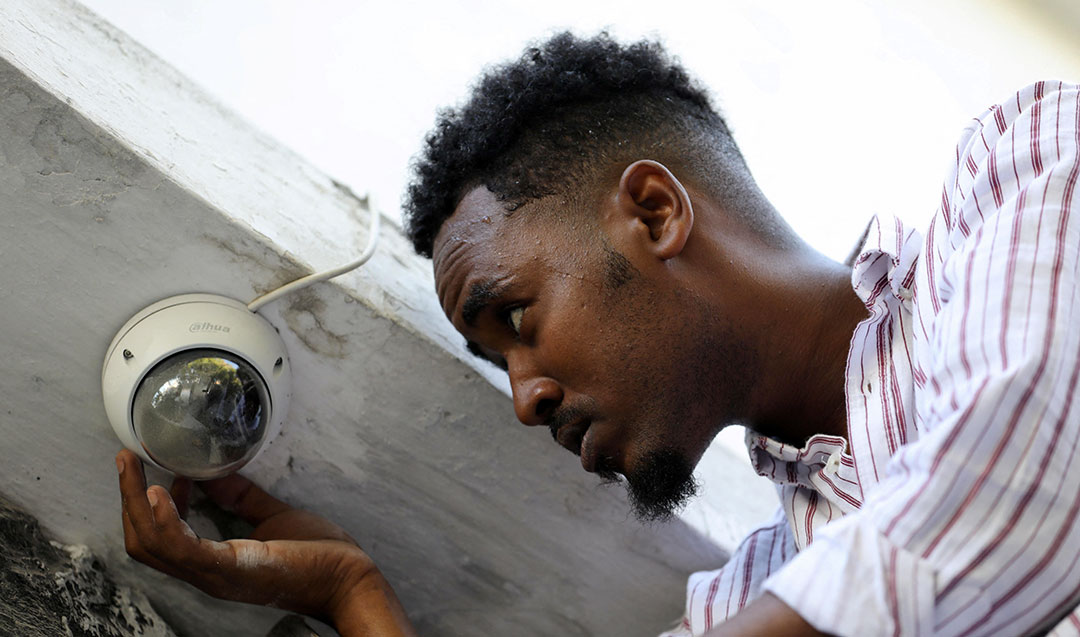ADF STAFF
In Somalia’s capital city of Mogadishu, where al-Shabaab militants continue to plot attacks, people are fighting back with security cameras.
In recent months, bustling commercial centers have suffered a wave of bombings by the al-Qaida-affiliated terrorist group targeting the businesses that installed closed-circuit cameras.
Mohamed Ahmed Diriye, the deputy mayor of Mogadishu for security and political affairs, addressed the media while standing in Bakaara Market, the largest in the country.
“They are fighting against the cameras because they don’t want to be seen,” Diriye said after a series of bombings earlier this year. “It will never stop. We will work on it. We want the people to be alert.”
Thousands of security cameras have been installed throughout the city since the Somali National Intelligence and Security Agency (NISA) issued a directive in 2023 for businesses in large commercial centers to use them. Al-Shabaab previously had targeted streetlights and surveillance cameras that were attached to main roads and intersections.
NISA has recorded incidents of al-Shabaab militants intimidating businesses as part of the group’s program of systematic extortion. Al-Shabaab generates an estimated $100 million a year through illegal taxes, forced donations and extortion. The Somali government made a concerted effort in 2023 to tackle al-Shabaab’s finances and said it succeeded in cutting the group’s revenue streams in half by shutting down suspected bank and mobile money accounts and by targeting the militants’ taxation schemes.
The primary goals of NISA’s security-camera mandate were to monitor the activities of al-Shabaab militants in key areas, gather vital evidence and give people a sense of safety. But al-Shabaab quickly responded with a spokesperson issuing threats to target anyone who complied, leading to the closure of several businesses.
“There are murderers called Khawarij (Arabic translation: “seceders” or “those who exit the community”) who are against the stability of this country,” Diriye said. “When weakened, they try whatever acts they can to disrupt.”
At least six people were killed and four wounded in attacks on businesses in the Dayniile and Hodan districts since the start of October. Some were victims of bombings, while others were business owners assassinated in shocking daytime raids. In August, al-Shabaab fighters set fire to two major markets on the outskirts of Mogadishu, resulting in millions of dollars in losses. Business community leaders said the attacks were in response to the installation of security cameras.
Diriye said the cameras are indispensable, effective tools in the fight against al-Shabaab.
“These cameras serve a crucial purpose in safeguarding our neighborhoods,” he said. “They play a vital role in preventing crimes and facilitating the identification and apprehension of offenders.”
Several businessmen told the Reuters news agency that al-Shabaab operatives ordered them to take down the cameras, but government officials have warned they could face consequences for doing so.
“We warn them against taking orders from terrorists,” Diriye told Reuters after the October attacks. “Anyone who removes the cameras will face the law.”
Farah Aden, a shopkeeper in Dayniile, said business owners feel trapped and vulnerable to attacks. “There is new fear due to security cameras,” he said. “We are in a dilemma. We are caught between two opposite directives.”
Other Mogadishu residents welcomed the surveillance cameras. Second-year university student Ahmed Ibrahim said they are reassuring to people trying to lead normal lives.
“In the past, it was difficult to attend school or college,” he said. “There used to be explosions just outside the school or university campus and when going back home.”
Diriye vowed to bolster the presence of security forces in Mogadishu’s commercial centers.
“After much effort we succeeded in persuading people to install cameras,” he told the news agency. “Many security intelligence forces in plain clothes were deployed to Bakaara market and stayed there day and night to ensure the safety of the camera installation until locals got accustomed to the cameras.”


